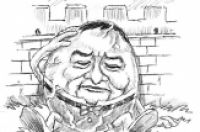
Illustration: Peter C. Espina/GT
China’s leading ceramics manufacturer Marco Polo Group’s Chairman Huang Jianping, a deputy of the 12th National People’s Congress (NPC), made headlines recently after blaming Alibaba Group Chairman Jack Ma and online platform Taobao for harming the real economy.
Huang submitted a motion to the NPC which focuses on cracking down on counterfeit goods sold online and revitalizing the real economy, according to media reports.
Huang took aim at Ma because of a large number of Taobao shops selling fake Marco Polo ceramic products, hurting the interest of his company. According to Huang, taobao.com searches like "Marco Polo tile" or "Marco Polo" bring up more than 300 shops, but only two of them have been authorized to sell authentic Marco Polo products. The rest are all selling fake goods.
It is not uncommon for Ma or Alibaba, a representative of China’s e-commerce sector, to receive criticism from entrepreneurs, but it is uncommon to see an NPC deputy bring this criticism to the two sessions and even submit a motion concerning the issue.
While Huang’s company is indeed the victim of online counterfeit products, it may be an exaggeration to simply blame Ma or e-commerce for the sluggish real economy.
If anything, I think China’s e-commerce sector is undergoing superficial prosperity by adopting an inefficient and unsustainable business model, which is in urgent need of transition.
Generally speaking, the domestic e-commerce industry has so far failed to reflect a lot of hidden costs. A considerable number of couriers are temporarily employed and have to keep asking for pay rises to make up for their lack of social welfare. Thus, it could be expected that the e-commerce sector will see rapid labor cost growth in the near future.
The cost for companies to follow government regulations and obtain approvals is very high, and will likely become higher. Incomplete statistics suggest that such costs may account for 12.6 percent of total costs in the logistics industry, much higher than the 4 percent average for other industries in China.
Logistics costs, an important part of goods circulation, are also uneconomical as e-commerce encourages consumers to make as many purchases as possible, leading to surging logistic services.
The reason why e-commerce is still being encouraged in China is because all these hidden costs haven’t been reflected in pricing.
Moreover, as the industry is enjoying a lot of direct and indirect subsidies and support, e-commerce still seems relatively cost-efficient in the public’s eyes.
First, the government’s mass construction of highways and other transportation infrastructure in China offers a perfect transport network, which should be considered a kind of subsidy for the e-commerce sector. While the e-commerce sector is facing rising logistics costs, the expansion of transportation networks is being shouldered by the government.
Second, tangible retail shops have suffered a great shock from soaring costs as a result of the urbanization drive, which has created a unique opportunity for the rise of e-commerce in China. Unfortunately, however, I believe this is a wrong marginal effect of the policy. Once there are new developments in the country’s urbanization policy, and property prices start to stabilize or even decline, e-commerce will lose its "efficiency" glory.
Third, while the government didn’t directly give e-commerce companies money, it offered them direct policy subsidies by providing major industry players with favorable policies in regards to land, taxation, direct investment and financing support.
Given the huge hidden costs and great uncertainties, the e-commerce business model is not efficient at all, which is why the sector needs to find a way to transform.
On the other side, China’s retail sector may see a resurgence in the years to come, considering the urbanization trend and the country’s aging society.
This piece originally appeared in http://www.globaltimes.cn/content/1036963.shtml?from=groupmessage&isappinstalled=0




